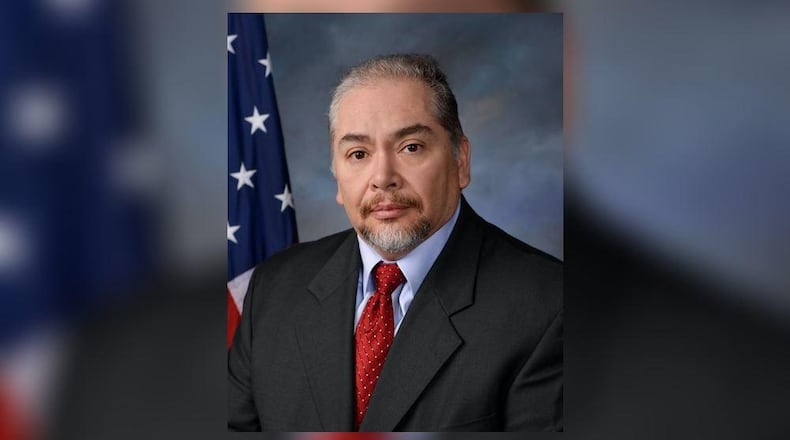On a day when he handed down sentences against two defendants, U.S. District Judge Michael Newman imposed concurrent life sentences against Goddard on counts related to drug offenses and the murder of DelRio, with 120 months imposed for the use of a firearm tied to a drug trafficking crime.
Essentially, Goddard received a life sentence plus ten years in prison for his crimes. Newman noted that Monday’s sentence came almost 20 years to the day when Goddard first stood in Dayton’s federal court for separate drug offenses, on Sept. 17, 2004.
“It seems he has not learned his lesson,” Newman said.
In the day’s first sentencing, Newman observed that although Cortner did not pull a trigger in the encounter, he did purchase firearms used in a conspiracy to traffic drugs.
“The community lost someone who had dedicated his life to protecting it,” Newman said. “It will never be made whole.”
Newman imposed two life sentences against Cortner for counts related to conspiring to distribute fentanyl and marijuana, with a five-year sentence imposed for another count tied to the carrying of a firearm during a drug trafficking crime.
Both 44 when they were convicted, Goddard was found guilty of murder, while both he and Cortner were also found guilty of multiple narcotics and firearms crimes. Goddard was found guilty of seven total counts and Cortner of four.
Amy Smith, a federal prosecutor, asked Newman to remember that police found some 50 pounds of marijuana at the Ruskin Road house where both men were arrested, with 6 kilograms of cocaine, more than 4 kilograms of fentanyl and $55,000 in proceeds from drug sales.
Those were enough drugs, the judge later said, “to cause an overdose of almost every person in the Miami Valley.”
A statement drafted by several of DelRio’s family members, read by Erica Hampton, recounted the kind of father and grandfather the detective was.
“Today, we are ready for peace,” Hampton said, reading before the sentencing of Cortner. “We are ready to move forward. And we are ready for justice.”
Cortner spoke, accusing federal prosecutors of violating his constitutional rights, and turning to DelRio’s family at one point and saying, “May God continue to bless you to help you move forward in your life.”
Turning back to the judge, he asked Newman to “look at me as the man I am, not as the man they accuse me of being.”
Goddard also spoke at his hearing, against the advice of his attorney. He apologized to his children and his mother, argued that the 2019 search had been conducted without probable cause and said law enforcement officers had “perjured” themselves against him. He also claimed his attorneys had done more for the government than for him.
Dayton has long been an area of national focus of many federal drug enforcement efforts because of the disproportionate impact the opioid crisis had in the region, near the intersection of two major interstates.
In 2016, DelRio referred in court documents to Dayton as “a destination city” with a large market for heroin.
In November 2019, the dangers that accompany that work came into vivid view when DelRio, a 30-year veteran, was shot twice in the face as he entered the basement of a one-story brick house shortly after dark as officers tried to serve a search warrant.
DelRio approached a home at 1454 Ruskin Road with other Drug Enforcement Agency task force members. The task force knocked on the door and entered after no one answered. DelRio moved into the basement and came under fire, as federal court records described the events.
Due to the severity of his injuries, DelRio was transported to a hospital in a marked cruiser. Five people were taken into custody for questioning, including a juvenile and four men.
Crews found, besides drugs, three guns, a drug press, a money counter and some $55,000 in cash, federal documents indicated.
“We stand with the DelRio family and our law enforcement partners, and we recognize that DEA Task Force Officer Jorge DelRio sacrificed his life to protect this community. As was stated by Deputy Criminal Chief Tabacchi at today’s sentencing, Task Force Officer DelRio ‘was a son of the Dayton community, serving with dignity and selflessness.’ We will never forget his ultimate sacrifice,” U.S. Attorney Kenneth L. Parker said in a statement.
“The Dayton Police Department is pleased to see the sentences imposed against Nathan Goddard and Cahke Cortner in the tragic shooting of Detective Jorge DelRio,” Dayton Police Chief Kamran Afzal said in the same statement. “They mark a significant step of closure for Detective DelRio’s loved ones, our department, and our community. We extend our gratitude to the U.S. attorney’s office for their diligent efforts throughout this case. It is imperative that those who inflict harm in our community are held accountable.”
In 2018, Homeland Security Investigations special agents who work under U.S. Immigration and Customs Enforcement trained more than 300 law enforcement personnel in Ohio on the dark web, virtual currency and how financial transactions take place that facilitate the smuggling of fentanyl into the United States.
A third co-defendant in the case, Lionel Combs III, 45, pleaded guilty just before the start of a trial to maintaining a drug premises, a crime punishable by up to 20 years in prison, federal prosecutors have said. It is unclear when he will be sentenced.
About the Author


